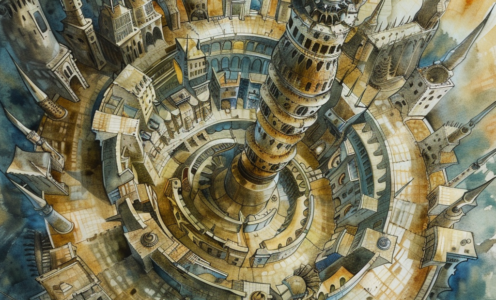Right to Rule
Location: Mechanus
See also: The Legislate (a sect of Mechanus)
Character: The Guvners are backwards! they say we’re all governed by laws, but it ain’t the case. In fact, laws are things created by people, not things that create people. The modrons understand this; all their law comes from an overlord. So is it with us. We create and follow the laws, and those who can create more laws are less restricted by laws. It’s tough for a berk to understand, but you’ll get it eventually. Oh, and by the way, welcome to the Swarm. You own me 2 coppers for my time. Why? Because it’s the law!

Ruler: The official ruler of Right To Rule is called the Lawmaker, a position currently held by Hijarr Liefinder (planar tiefling wizard [he/him] Legislate / LN). The longest office holder in Right to Rule’s recorded history, Hijarr has shown incredible competence in his 85 years of reign, as well as unshakable drive. His will, which is strong even in his old age, is the one thing that keeps him in power.
Behind the Throne: Because anyone can rule this burg in time (see below), nothing is quite certain. The families of Distinction all have a shot at holding the seat of Lawmaker, but seven families are nearly tied as best bets. They are named Goaldcut, Tiebbynd, Laexicon, Ilnott, Yrontil, Klorskip, and Oarder. Their occupations (and the areas over which they hold authority) are the minting of currency, the contractual legal system, the collection of knowledge, medicine and public health, zoning in the city, entertainment, and trading, respectively. All save Laexicon (a Guvner family) are loyal to the Legislate.
Description: Right To Rule is considered a bit of an aberration in Mechanus, and slips into Acheron or Arcadia at least once a century, though it always comes back to Mechanus in the end. Set on a large circular cog, the city is arranged much like a nautilus shell, with five districts. The largest coils around 2/3 of the cog’s perimeter, and the next four, which get progressively small, coil around the shaft at the centre of the gear. The city is very large, and is home to over 50,000 people.
The largest district is called Unity. In Unity, the zoning laws (perhaps the single most important aspect of Right To Rule, for reason that quickly become clear) are very strict. All houses must be of exactly the same size and shape, and all streets must run at regular intervals and be parallel to one another. It is quite literally impossible to tell one part of Unity from any other. The city runs all the way up to the edge of the gear, with no space wasted. People here have little identity and little will, and form the backbone of the city’s working class. Unity is often called Simplicity by its inhabitants, who value the simple, predictable nature of their lives. Because they lack any real identity and acts as one, detractors call Unity the Swarm.
Lying inside a wall which separates the other sections from Unity (and each other), is the second district, called Conformity. Here, the houses are as rigidly organises as they were in Unity, but are a bit larger. However, the district is divided into a number of section, called blocks which have streets running at different angles from other blocks. Also, there is moderate variation in buildings in different blocks. Those inhabiting each block tend to have a similar outlook, but two separate blocks can have very different ideas. Those who insult the secular nature of Conformity call it Cliques, but the natives prefer calling it Community.
In the next, smaller section is Cooperation, where the basic zoning laws being to break down. There are only vaguely defined streets, and buildings vary wildly in shape and size (though most are larger than those in Conformity). Opinions are as varied as architecture, and the district is a teeming morass of constantly shifting small interest groups, made up of like-minded individuals. The most habitable of the districts, those who enjoy the lifestyle of Cooperation call it Creativity, but those who crave more (or less) power usually call it Mishmash.
The fourth district, made of the noble houses, is called Distinction. Here, no laws really apply to each noble manor, which exists separately from all others. Each manor houses a family of very similar people, who are in fierce competition with the other noble houses for power. This is an area of intrigue and politics, with little alliance outside of one’s own house. The nobles enjoy their relative freedom, and call their district Freedom as a result. Many others call is Separation, because they find the noble houses to conflicting.
Finally, the fifth and smallest district, called Individuality, holds the palace of the Lawmaker. Here, the Lawmaker and his family, who seem like near-clones of their patron in mindset, run the rest of Right to Rule. Many look up to the impartial district and call it Independence, the truest measure of freedom. Others, who prefer the feeling of community granted by other people, call it Solitude.
The dark of all this is simple: Your rank in society and thus the location of your home int he city is determined entirely by your capacity to make laws. The Swarm has no real power, though the entire city relies on its sheer population for its military and its labour. When a person becomes trusted enough by the multitudes of Simplicity, they wake up to find themself in a block of Conformity which matches their mindset. From there, they must gain the right to represent their peers well enough to speak for them all, and thus make laws on behalf of the people, thereby allowing themselves to pass into Cooperation. The noble houses of Distinction are all tightly allied groups of similar law-makers who hold power over all but the other noble houses and Individuality. The Lawmaker rules over all as the ultimate representative. It is possible to regress backwards in this process, as a person looses the trust of those below them. The tower must have a base to stand on, if you will.
Thus each district, collectively, can impose general law on all districts below it. The Lawmaker makes general laws that affect all districts but his own. The noble houses are the high authorities for the various necessary functions of the burg. Other, less powerful noble houses focus on military matters, law enforcement, etc. Interestingly, agriculture is never a noble house’s major faculty, because a native of the burg requires no food while on that cog. The Mishmash acts as the middlemen to Cliques, and they to the Swarm. Thus, though focused more on the individual, the city is still primarily one of Law.
The major export of Right To Rule is the Legislate. A sect that dominates the burg, it has not caught on elsewhere—mainly because of the Guvner monopoly on Sigil and the homebound nature of the sect—but its presence is well known. Historically, the sectol of the Legislate has always been Right To Rule’s Lawmaker.
Overall, Right To Rule’s ultimate nature is determined by the district you are currently in. In Simplicity, one can get easily lost, but any major service you require isn’t far away. In Conformity, life is a struggle of which is the major clique. Cooperation sports a lively, active intellectual climate, since all the residents know well that, if they let themselves become stupid, sloppy, or disrespected they risk sliding back into Cliques. Separation is almost vindictively lawful, with emotion riding higher than any other district. Solitude has the aura of peace coming from absolute power that makes it relaxing, but the Lawmaker can never rest, as they must maintain their position vigorously or fall in station.
Interestingly, all newcomers must live in Unity. This is not a law, but a fact. No matter what precautions are taken, the person will shortly find themselves in a small building in Simplicity. You have to work for power in Right to Rule.
Militia: Most of Right To Rule’s army is composed of Swarm minutemen. Because invaders are only really a problem when the city shifts to another plane (at which point, the military noble house often leaps to Lawmaker). These minutemen are lead by elite infantry from Conformity, supplemented by crack surgical strike teams from Cooperation, and led by generals from Distinction.
Breaking the laws of Right To Rule are dangerous, but no more than the rest of Mechanus. Since the locals usually follow the rules anyway, there is little need for patrols of policemen. Outsiders who are caught breaking rules are given three chances. First, they are given a warning. Then, they are incurred an incredible fine (usually more than a body has) and forced to work as members of the Swarm for a set period of time (effectively erasing all power a local had). The third offence is death or, under special circumstances, exile. Severe crimes, including murder, arson, treason, and magically charming a person to affect the laws all result in either death or exile.
Services: Right To Rule offers a number of services. First off, as a large city, any number of specialty services are offered to those who work to find them (Cooperation is almost always their location). Right To Rule is known for two things more than most burgs, however: The Legislate and magic.
The Legislate fills every corner of the burg, and is almost a requirement for rising in the city’s districts. For each rank achieved in the sect, the sector must return to Right To Rule to register. Thus, as the greatest base of power in the Legislate, Right To Rule is often synonymous with the sect.
As for magic, the Laexicon family has risen remarkably to the rank of noble house, largely on the basis of its magical resources. A family of magi, the House provides law-based magics. Laexicon both buys and sells magic relating to law in some manner.
Local News: The Legislate has recently made a powerful (if surprising) ally: the Fated. Though the two are very different, both feel that the strong (though what is strength varies between the groups) get what they want and hold what they can. This has disturbed the Guvners, who regularly find themselves against the Fated by alliance (the Hardheads do NOT like the Fated). The presence of a potentially chaotic presence on Mechanus is also disturbing to them.
Perhaps the cause or perhaps the result, the Laexicon family is becoming far more active in its field than it had been in the past. With Hijarr slowly succumbing to age, the city is ripe for a power struggle, and Laexicon is as likely a winner as any other noble house. But a Guvner Lawmaker spells problems for the Legislate. After all, does that make the Guvners the leaders of the Legislate? Or, because of the different allegiance, will the position of Lawmaker fall to a noble house, and if so which one? These vexing problems, compounded by the inexperience to current population (which is mostly human and was not alive when Hiljarr became Lawmaker) in these matters, is causing paranoia to ripple through the town. While the Laexicon family still holds the will of the people, other Guvners are being persecuted as spies, and at least three were exiled in the last week. Laexicon has petitioned Tiebbynd to try to outlaw this type of behaviour, but they are resisting because of the faction/sect conflict. One thing is certain: the children of Right To Rule will live in interesting times.
Canonwatch: This is a homebrew burg that is not in the Planescape canon. See also the sect the Legislate.
Source: Belarius


